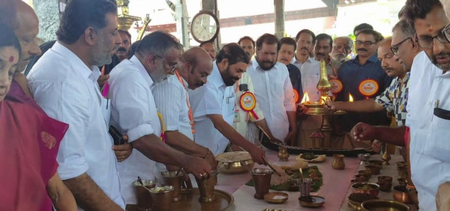In Pathanamthitta, Kerala, a long‑standing temple tradition has thrown the state’s ruling party into a sudden crisis. The controversy centers on the Aranmula Parthasarathy Temple, one of Kerala’s most famous and culturally significant shrines.
The upset began during the Ashtami Rohini festival on September 14, when Devotees and officials say that the iron‑clad lamp—a key part of the ritual—was lit outside the temple by Kerala’s Devaswom Minister, V.N. Vasavan, before the food offering reached the deity. Traditionally, the lamp is turned on at the temple flag mast after the mid‑day puja and before the gold‑filled feast is presented in front of the god. Deviating from this sequence has led many people to view the act as a serious breach of protocol.
Tantri Thekkedath Kuzhikkattil Parameswaran Vasudevan Bhattathiri, the temple’s head priest, wrote a strong letter to the Travancore Devaswom Board, the Commissioner, the Administrative Officer, the Palliyoda Seva Sangham, and the Temple Advisory Committee. In it, he labeled the act a violation of tradition and called for those involved to perform a public penance.
“It is necessary that those responsible admit their error publicly,” the Tantri wrote. His letter sparked a flurry of reactions. The Palliyoda Seva Sangham quickly denied any wrongdoing, claiming the Tantri had not seen the ceremony firsthand and that the Board itself had misinformed the priest about the event. They also suggested the Board was attempting to shift blame.
Under growing pressure, the Board’s president has now asked the Assistant Commissioner and the Administrative Officer to explain what happened. The question stands: did the minister knowingly flout customs, or was there a misunderstanding of the schedule?
The controversy has put the Communist Party of India‑Marxist (CPI‑M) under a tough spot. Earlier in the week, members of the CPI‑M’s Pathanamthitta district committee accused the media of spreading false propaganda. Now, the Tantri’s public statement that the fault lies with the Board has forced the party to defend its allies.
“The allegations are false,” the CPI‑M said. Yet the Temple Advisory Committee maintains it has evidence of a clear violation and will continue its complaint. For now, the Lord’s sanctum and the state’s politics share a single problem: how to preserve ancient rituals while keeping everyone in the state informed.
The case illustrates how deep‑rooted customs can fuel political drama. As Kerala’s most charismatic temples attract millions of pilgrims each year, any deviation from the rituals can spark heat. The Aranmula incident reminds leaders that upholding tradition is as much about respecting culture as it is about avoiding scandal.
Source: ianslive
Stay informed on all the latest news, real-time breaking news updates, and follow all the important headlines in world News on Latest NewsX. Follow us on social media Facebook, Twitter(X), Gettr and subscribe our Youtube Channel.



